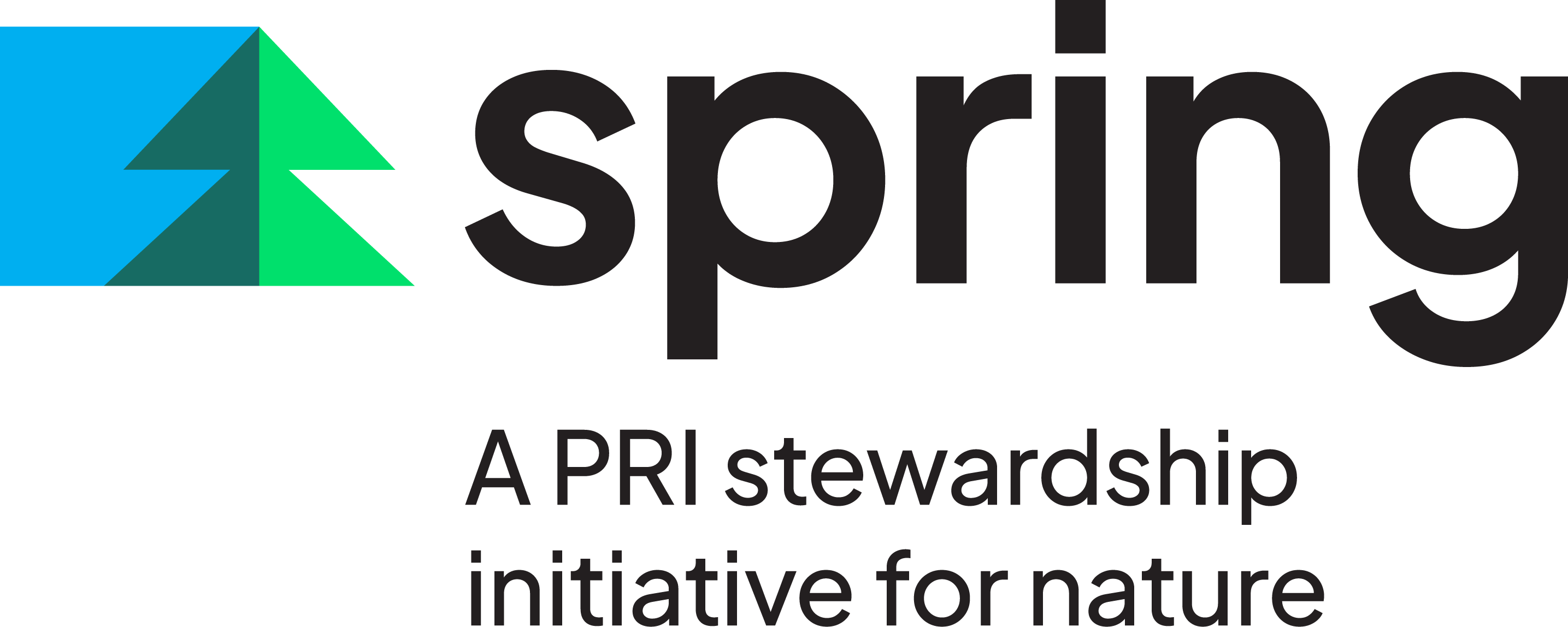Frequently Asked Questions (FAQ)
The PRI is a network of over 5,300 signatories who collectively manage more than US$120 trillion in assets under management*. The PRI executive has been coordinating investor stewardship initiatives for more than 10 years, including Advance, the Investor Initiative for Sustainable Forests and the Investor Working Group on Sustainable Palm Oil, and is playing a key role coordinating collaboration within Climate Action 100+, the world’s largest investor collaborative engagement.
The initiative is part of the PRI’s wider support to signatories on managing nature-related risks and opportunities.
The PRI will work closely with organisations leading similar initiatives, to ensure greater efficiency and effectiveness in achieving progress. For more details on other nature-related investor initiatives, see Navigating a new moment for investors on nature.
*Numbers are as of September 2023
Spring was officially launched on June 26, 2024. On this date the PRI publicly released the names of endorsing and participating investors, including the companies with whom they are engaging and a second batch of focus companies, open to new applications.
PRI signatories are invited to apply to participate in Spring and indicate which engagement group(s) they are interested in joining, from the available positions in the list of focus companies.
For more information about how to join Spring, please visit the Join Spring page.
Forest loss and land degradation has been prioritised as the first driver of biodiversity loss, which will be addressed through PRI’s stewardship initiative due to:
- Its significant contribution to global biodiversity loss, in addition to its contribution to climate change and association with human rights violations;
- Existing PRI expertise, developed during past programmes on deforestation and sustainable commodities; and
- A strong investor demand for PRI to convene a stewardship initiative on this topic, due to potential systemic risks that can directly affect company performance and investor returns.
A phasing-in of further drivers of biodiversity loss will be considered in the medium to long-term, for example to address drivers of biodiversity loss in other realms (e.g., oceans, freshwater).
For further information on Spring’s engagement approach, please visit the About Spring page.
Mitigating the systemic risk of nature and biodiversity loss will require sound public policy as investors cannot diversify away from them and the impact of voluntary corporate action has been limited. Responsible corporate engagement on environmental policy can play a critical role in helping governments create practical policy solutions, while negative and resistant corporate interest can hinder policy action that aims to mitigate the impacts of climate change or to curtail biodiversity loss.
Collaborative engagement on responsible political engagement can enable increased efficiency and effectiveness in achieving progress.
For more information on the materiality of responsible political engagement, please visit the About Spring page.
Yes. While Spring particularly focuses on corporate responsible political engagement, where appropriate, the initiative will seek to promote other risk-mitigating positive outcomes for nature.
For more information on the high-level company asks, see Spring’s investor statement.
No. Spring will focus on company engagement. The engagement with those companies will, where appropriate, include a focus on their political engagement practices. A future phase of Spring or another PRI initiative may focus on direct investor policy engagement, which will be on an opt in basis.
In parallel with Spring, the PRI supports investor engagement with policymakers, for instance through the PRI-supported Investor Policy Dialogue on Deforestation (IPDD). The IPDD is an existing, and successful, collaborative engagement initiative focused on investor engagement with policymakers on biodiversity loss associated with deforestation; in both soft commodity-producer countries (Brazil and Indonesia) and consumer countries (UK, EU and US). Its secretariat is held by the WEF Tropical Forest Alliance.
The PRI provides information and practical suggestions for signatories who want to engage with policy makers.
Participation is open to all PRI signatory asset owners, investment managers or engagement service providers with a specific mandate to represent an institutional investor. The following roles are available:
- Endorser: Endorsers are PRI Signatories that publicly endorse the Initiative by signalling their support for the objectives and strategy of the initiative.
- Participant: Participants are investors who independently and while keeping with all regulatory and legal requirements engage with focus companies as part of the initiative.
- Lead Investor and co-lead investor: Lead investors lead on engagement strategy. They are the main point of contact between focus companies, collaborating investors and the PRI Executive.
- Collaborating investor: Collaborating investors proactively support lead investors and co-lead investors in their engagement with focus companies through for example, participation in preparatory calls and engagement meetings.
Further information on the joining requirements as endorsers or participants is available here: Join Spring.
There is no fee to sign-up as an endorser or participant.
The sign-up form remains open on a rolling basis for applications where opportunities are available.
Candidates are invited to complete this form on the Join Spring page.
Investors can sign-up as an endorser at any point. If an investor applies to join a specific engagement group but cannot join at that time because the engagement group is full, or because the investor doesn’t currently meet the relevant criteria, the investor will be added to an engagement group waiting list.
No. The PRI and Spring are committed to compliance with all applicable laws and do not seek, require or endorse individual or collective decision-making or action that is not in compliance with those laws. The use of particular tools and tactics, and the scope of participation in the Spring initiative, is at the discretion of individual participants and subject to all relevant laws, including competition and antitrust laws. Investors must make independent decisions regarding voting and engagement strategy, and are encouraged to consult their own counsel as appropriate.
Engagement with companies is carried out by participating investors and, with the lead investor(s) who, while keeping with all regulatory and legal requirements, are responsible for setting a company-specific strategy for engagement based on the overarching objectives of Spring.
The participating investors collectively form the Investor Working Group (IWG), responsible for carrying out day-to-day engagement activities with companies. The PRI does not itself engage directly with companies although may join meetings as an observer.
Further information on the company engagement groups is available on the Companies page.
No. Endorsers are investors who signal their support for the initiative’s objectives and strategy. They do not participate in engagement activities within the initiative and will be listed separately to participants in public information about the initiative. Endorsers who wish to engage companies via the initiative are now invited to apply to participate in Spring by completing this form on the Join Spring page.
Endorsers who outsource their stewardship activities are invited to encourage their investment managers and engagement service providers with responsibility for engagement to apply to take part in Spring or consider committing to aligning their own engagements to the objectives of the initiative.
Further information is available here: Investors and Join Spring.
The PRI is supportive of any initiative which increases and improves the effectiveness of investor action on nature. Therefore, we will work closely with existing investor initiatives to ensure greater efficiency and effectiveness in achieving progress.
Spring’s aim is to complement existing work by other initiatives so that they can deploy their resources in a way that is synergistic and minimises the likelihood of engaging in duplicative efforts or working at cross-purposes. With Spring’s strategic emphasis on 1) key geographies, 2) forest loss and land degradation as a driver of biodiversity loss, and 3) the political engagement of corporates, we have sought optimal additionality to existing initiatives.
We are working closely with Finance Sector Deforestation Action, the Investor Policy Dialogue on Deforestation (IPDD) and others to ensure our programmes of work complement and reinforce each other as much as possible by aligning our strategy and communications. In addition, we are in contact with the Nature Action 100 Secretariat (held by Ceres and IIGCC).
For more details on other nature-related investor initiatives, see Navigating a new moment for investors on nature.
A small number of the company names that Spring released are also engaged through other initiatives. In these cases, Spring will develop an engagement strategy that seeks to optimise additionality and avoid duplication or conflicting messages. For example, this may result in a greater emphasis on a company’s political engagement practices or on nature-related risks in a company’s supply chain, as appropriate. The secretariats of the various stewardship initiatives will explore this additionality on a company-by-company basis.
No. The company selection methodology focused on identifying prominent companies operating in policy arenas that significantly impact the dynamics of forest loss and land degradation in priority geographies. Companies were not assessed against any criteria related to Responsible Political Engagement, zero-deforestation and conversion or other topics. Therefore, the inclusion of companies on the list does not suggest any form of irresponsible conduct.
For more information on the company selection process, please visit the Companies page.
No. Spring acknowledges that a substantial number of high-quality benchmarks and frameworks already assess action on nature, and deforestation in particular. Therefore, Spring has opted not to create its own public benchmark, but instead leverage the professional expertise underpinning existing frameworks to inform its Company Assessment Framework. This approach ensures that the initiative avoids duplication or confusion and allows participants and stakeholders to track progress in a robust and efficient manner.
Spring tracks the performance of focus companies through a bespoke set of indicators from the World Benchmarking Alliance (WBA)’s Nature Benchmark and the Global Standard on Responsible Climate Lobbying, covering disclosures regarding Responsible Political Engagement and adapted to focus on nature and biodiversity. The RCLS indicators are complemented by the InfluenceMap Biodiversity Assessment, which scores companies based on their implementation and practice of Responsible Political Engagement.
For more information, see the Company Assessment Framework and accompanying Guidance Note.
Each of Spring’s Company Engagement Groups develops a tailored engagement strategy. Such strategies are informed by the Company Assessment Framework, while allowing the flexibility that participants may also opt to identify specific objectives that are most relevant for a particular company. To support this process, the PRI will curate a toolkit of specific, best-in-class frameworks and principles, with relevant guidelines to support their use. This toolkit will be developed with stakeholder inputs. Spring participants may refer to this toolkit when defining key objectives for company engagements. These might include industry standards, data platforms and best-practice principles applicable to a subset of Spring focus companies from relevant sectors.
For more information, see the Company Assessment Framework and accompanying Guidance Note.









